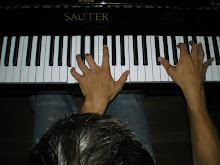Art is Expression.
No matter how you look at it, this art thing is some kind of expression. This may be really obvious to some, but contentious to others. A non-statement is the total antithesis of art, and no matter how close we try to come to expressing in art a concept of non-expression, we will fail, as any attempt to not-express something is also a statement of some sort.
The minimalist, Donald Judd, has tried to undermine the traditional notion of art as an expression by placing randomly colored block "sculptures" in no particular order- installed and placed, not my the artist, Judd, but by other people. But in doing this he makes a statement, a gesture about what is to be an artist- thereby making his art a form of expression, despite how cryptic the message may be to the viewer. 
As i've said before, Aesthetics is a ladder of values, the most important concepts on the top, and others of lesser importance below them. In the complex world of a real-life art movement, there are many values that the artist will hold, not just one, but typically there will be one that stands out as the most important.
During different periods in the history in art there have been various opinions on what is important and relevant to art. The question of values have been answered differently by different art-movements, and so we can not approach all art the same way.
I wrote this bit below to explain to someone this concept- my intention was to show the core value of an art movement:
Classicism: The Main concept is that art as the expression of a harmony between forms
Romanticism: Art as the expression of the individual
Realism: Art as the expression of the times, the period, era.
Etc. And then you have many debates on the matter, but the fact is, that the idea of art as expression is a universally accepted axiom, whereas "art as the expression of a harmony between forms" is not. Think of that as the starting point.
It is also important to note that i do not find genres or "styles" from different periods to be the end-all of what any art is. The genre should inform, but not determine, the way in which we look at a work of art. Far to frequently i see critics who just write of some genre as an all encompassing whole- how some artist fits into the definition of the movement(s) associated to them - and not treating an art movement like what it really is- a generalization we've made to organize thought.
_____________________
Its 3:41 in the morning, i should probably be sleeping. Sorry if this is more boring than usual (or more poorly written). I get to blame it on the hour of day.

No comments:
Post a Comment